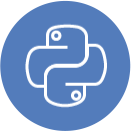Our Alumni Work At

"AI to contribute $16.1 trillion to the global economy by 2030. With 133 million more engaging, less repetitive jobs AI to change the workforce." - (Source). Data Science with Artificial Intelligence (AI) is a revolution in the business industry.. AI is potentially being adopted in automating many jobs leading to higher productivity, less cost, and extensible solutions. It is reported by PWC in a publication that about 50% of human jobs will be taken away by the AI in the next 5 years.
There is already a huge demand for AI specialists and this demand will be exponentially growing in the future. In the past few years, careers in AI have boosted concerning the demands of industries that are digitally transformed. The report of 2018 states that the requirements for AI skills have drastically doubled in the last three years, with job openings in the domain up to 119%.
Data Science Certification Course in Chennai FAQs
The students learn next-generation technologies such as AI, machine learning, predictive analytics, and cloud-based data solutions so that they remain relevant and competitive in the rapidly changing tech 2025.
Yes, 360DigiTMG has a hybrid model of learning in Chennai as well. Students can take physical classes as well as online classes and materials. This offers learners the convenience of balancing professional responsibilities while having hands-on experience and guidance from experts.
Yes, the course features industry-specific case studies specific to local and international business contexts. The students analyze actual datasets, work on real-life business issues, and learn how data science informs decision-making in industries like healthcare, finance, retail, and IT.
In Chennai, individuals have a variety of options for learning, with top-tier programs offered by esteemed institutes such as 360DigiTMG. The institute provides comprehensive courses designed to meet the growing demand for skilled data professionals in the industry.
The wage of a data science specialist in Chennai is subject to the variation determined by parameters such as experience, skills, and the employer. The average entry-level data scientist in Chennai can earn anywhere from INR.5,00,000 to around INR.8,00,000 annually, while experienced professionals with a lot of experience can earn an annual salary of over INR.15,00,000 or more.
Data Science necessitates some fundamental skills such as acquaintance with programming languages like Python or R, statistical analysis, machine learning techniques, data visualization and domain knowledge being in fields like finance, marketing and e-commerce.
To become a successful data scientist, one should focus on gaining a strong foundation in mathematics, statistics, and programming. Additionally, acquiring practical experience through internships, projects and continuous learning. staying updated with industry trends, and effective communication skills are crucial.
The highest qualification for a data scientist varies, but many professionals hold advanced degrees such as a master’s or Ph.D. in fields like data science, computer science, statistics, mathematics, or related disciplines. However, practical experience, certifications, and a strong portfolio of projects can also contribute significantly to one's qualifications as a data scientist.
Yes, typically it takes around 6 to 12 months to develop a strong foundation and proficiency in data science. While it is possible to learn the basics in three months with dedicated effort, achieving mastery often requires additional time for deeper understanding, practical application, and gaining experience with real-world data sets.
Absolutely! Data science is a multidisciplinary field, and individuals from various backgrounds, including non-IT fields, can learn and excel in it. While a background in IT or computer science may provide a head start, it's not a prerequisite. Many successful data scientists come from diverse academic backgrounds such as mathematics, statistics, engineering, economics, social sciences, and even humanities. What matters most is a strong willingness to learn, curiosity, and dedication to acquiring the necessary skills and knowledge in data science.
Yes, data science can be an excellent career choice for graduates. A wide range of data science roles, from entry-level positions to internships, is available for new graduates who may utilize them to gain experience and move forward in their career. By mastering the right skill sets and acquiring knowledge, freshers may have an easier time getting into lucrative jobs in data analysis, machine learning, data engineering and related fields.
The salary of a data scientist can go up depending on factors like experience, location, industry, and the company itself. However, according to my last update, the average base salary for a data scientist in India is approximately between 6 to 12 lakhs (INR) per annum. While such figures can vary greatly on the factors indicated above. While such figures can vary greatly based on the factors indicated above, consulting platforms like Glassdoor can provide valuable insights into current salary trends.
Chennai's data science demand is on the rise, driven by increased digitization across industries. Companies seek skilled professional’s adept in data analysis, machine learning, and AI to leverage insights for informed decision-making. The city's prominence in IT and technology sectors further fuels demand for data science expertise.
Data Science focuses mainly on the extraction of knowledge and findings from data by means of complex methods, such as statistical analysis, machine learning, data mining, and data visualisation. It is the set of techniques that combines quantitative and qualitative methods, along with computer science, and domain expertise so that we can extract valuable insights and make wise decisions.
Data Science is the cornerstone of technology, healthcare, finance, retail, marketing, manufacturing, and telecommunications. It is the innovation accelerator that covers such topics as improved search algorithms, medical research, fraud detection, demand forecasting, innovative customer analysis, predictive maintenance, and internet improvement. These applications serve as tools for decision-making, with numerous businesses relying on them to grow and for insights to be garnered from different areas of commerce.
Data Science can be a tough subject as it is multi-disciplinary and thus one needs to be proficient in statistics, programming and domain knowledge to excel in it. On the other hand, one will find numerous resources available online, such as e-courses, mailing lists, and community forums, which provide ample support for learners at various skill levels.
Individuals from diverse educational backgrounds can pursue data science. Eligibility typically includes having a strong foundation in mathematics, statistics, and programming. Common backgrounds include computer science, mathematics, statistics, engineering, economics, and other related fields. However, with dedication and willingness to learn, individuals from any background can transition into data science.

Field of Data Science Jobs in Chennai
Chennai offers over 8,000 openings for freshers in analytics and related roles, representing 21% of India’s job market in this domain. Top recruiters like Tech Mahindra, TCS, Genpact, Wipro, and HCL Infosystems actively seek talent, providing ample career growth opportunities in evolving positions.

Salaries for Data Science in Chennai
The average salary for a Data scientist is 13.5 lakhs per annum in Chennai, India.Freshers typically earn between 1.62 to 4.0 lakhs annually, while junior data scientists receive around 5 lakhs per annum . Senior data scientists can expect an annual salary of 19 lakhs.

Projects for Data Science in Chennai
The Indian government has initiated several projects in Chennai across sectors such as Agriculture, Electricity, Water, Healthcare, Education, Road Traffic Safety, and Air Pollution, leveraging analytics and data-driven solutions.

Role Of Open Source Tools In Data Science
Python is easy to learn and maintain, making it an essential tool for developers working with data and machine learning projects. Its extensive libraries enable applications ranging from big data processing to predictive modeling. R, on the other hand, is widely used by statisticians for efficient data storage, manipulation, and analysis.

Modes of Training for Data Science
The course in Chennai is designed to suit the needs of students as well as working professionals. We at 360DigiTMG give our students the option of both classroom and online learning. We also support e-learning as part of our curriculum.

Industry Applications of Data Science
This field is applied in securities fraud early warning, card fraud detection systems, enterprise risk management, healthcare data analysis, seismic interpretation, reservoir characterization, energy exploration, traffic control, and route planning.
Talk to your program advisors today!
Get your profile reviewed
360DigiTMG - Data Analytics, Data Science Course Training in Chennai
Locations Offered - Data Science Training in Chennai, Data Science Training Institute in Thoraipakkam, Data Science Certification in Chennai, Best Data Science Institute in Chennai, Data Science Training in Thoraipakkam, Data Science Certification in Palavakkam, Data Science Institute in Karapakkam, Best Data Science Institute in Pallikaranai, Data Science Institute in Injambakkam, Data Science Training in Chennai with Job Assistance, Best Data Science Training in Thoraipakkam, Best Data Science Training in Injambakkam, Data Science in Thoraipakkam, Data Science Training in Hyderabad, Data Science Institute in Bangalore

